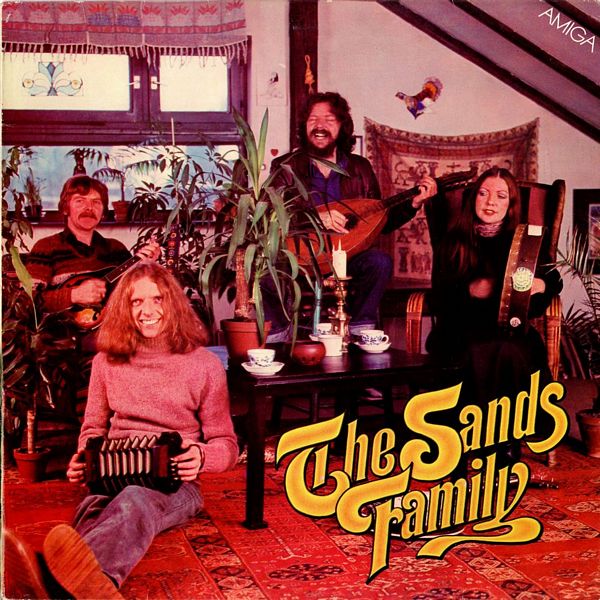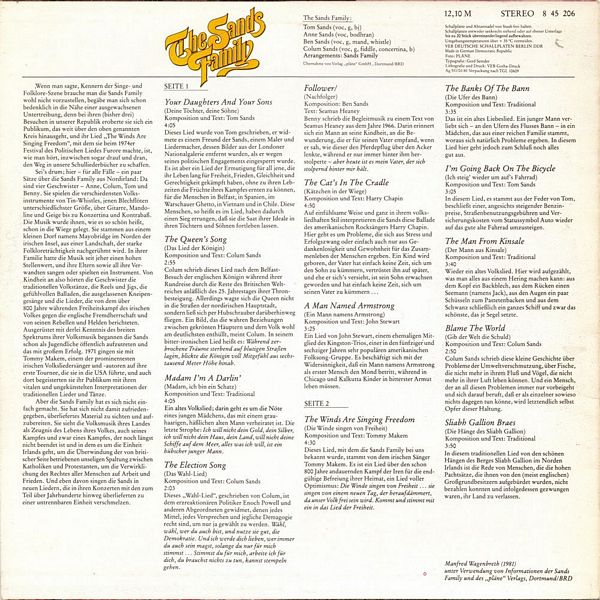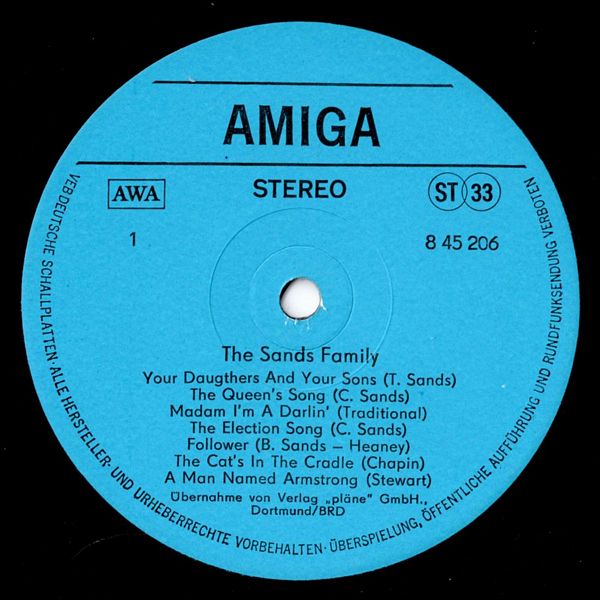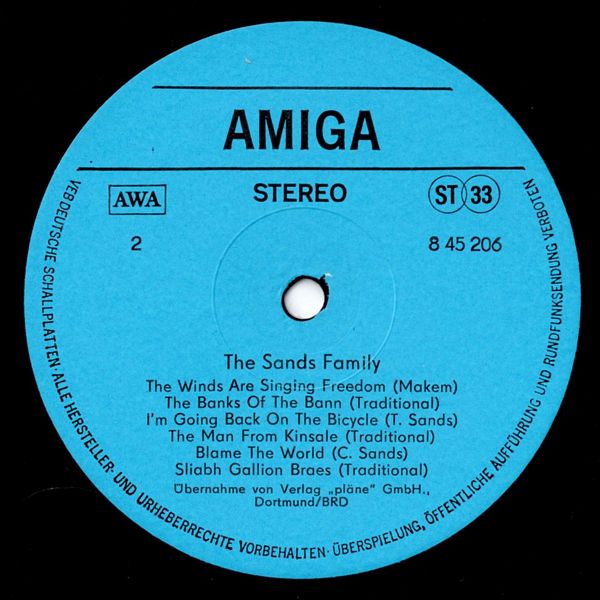
 |


 |
Sleeve Notes
If you said that connoisseurs of the singing and folklore scene do not need to introduce the Sands Family, then you would be alarmingly close to a full-blown understatement, because on their (so far) visits to our republic, they conquered an audience which goes far beyond the circle above, and thier song "The Winds Are Singing Freedom," with which they made a sensation at the 1974 Festival of Political Song, is, we hear, even on the verge of paving the way to our school songbooks to accomplish.
Your Daughters and Your Sons — This song was written by Tom, he dedicated it to a friend of the Sands, a painter and songwriter whose pictures were removed from the London National Gallery when he was imprisoned for his political involvement. But it is a song of encouragement to all those who have spent their lives fighting for freedom, peace, equality and justice, without being able to reap the fruits of their struggle in their lifetime, for the people of Belfast, Spain, in the Warsaw Ghetto, in Vietnam and in Chile. These people, it is said in the song, have gained a victory by letting the seeds of their ideals live on in their daughters and sons.
The Queen's song — Colum wrote this song after the British Queen's visit to Belfast on her tour of the remnants of the British Empire on the 25th Anneiversary of her accession to the throne. However, the Queen did not venture into the streets of the Northern Irish capital but was flying by helicopter over it. A picture that most clearly reveals the true relationships between crowned heads and the people, says Colum. In his bitterly ironic song, it says: While broken dreams lay dying on bloody roads, the queen looked down with sympathy from six thousand meters height.
Madam I'm a Darlin' — An old folk song. It's about the needs of a young girl who is married to a gray-haired, ugly old man. The last stanza: I do not want your gold, your silver, I do not want your house, your land, do not want your ships on the sea, all I want is a handsome young man.
The Election Song — This "song of choice", written by Colum, is dedicated to the ultra-reactionary politician Enoch Powell and other deputies who are right in every means, every promise, and every demagoguery to be elected. Choose who you are and use it well, democracy. And I will love you, whoever you are, as long as you only vote for me … If you vote for me, I work for you, you do not need to do anything, you can stamp.
Follower — Benny wrote the accompanying music to a text by Seamus Heaney from the year 1966. In it, a man remembers his childhood, the wonder he felt for his father, when he saw how he steered the horse plow across the field, while he was always stumbling after him — but today it's my dad who stumbles behind me.
The Cat's in The Cradle — The Sands interpret this ballad of the American rock singer Harry Chapin in a sensitive way and in their folksy-song style. This is about problems arising from stress and the compulsion to succeed, or simply from gratuitousness and habit for the coexistence of people. A child is born, the father just does not have time to look after the son, put him off later, and before he knows it, his son has grown up and just has no time to look after his father …
A Man Named Armstrong — A song by John Stewart, a former member of the Kingston Trio, a popular folksong group in the 1950s and 1960s. It deals with the incongruity that a man named Armstrong is the first person to enter the moon, while children in Chicago and Calcutta have to live in dire poverty.
The Winds Are Singing Freedom — This song, with which the Sands Family became known to us, comes from the Irish singer Tommy Makem. It's a song about the 800-year struggle of the Irish for the final liberation of their homeland, a song full of optimism: the winds sing of freedom … they sing of a new day dawning on our people will be free. Come and join in the song of freedom.
The Banks of The Ban — This is an old love song. A young man loses himself — on the banks of the river Bann — into a girl who comes from a rich family, which of course causes problems. In the end, everything is fine in this song.
I'm Going Back on The Bicycle — In this song, it comes from the pen of Tom, one decides, in view of rising petrol prices, road user charges and insurance costs from the status symbol car to switch back to the good old bike.
The Man from Kinsale — Again, an old folk song. Here are listed what you can do with a herring: from the head a baking tray, from the back a sailor (called Jack), from the eyes a few bowls for patty baking and from the tail finally a whole ship and that the most beautiful, that set sail ever.
Blame the World — Colum Sands wrote this little story about problems of pollution, about fish that are no longer in their river and birds that can no longer live in their air. And a person who always walks past all these problems and claims that he cAnneot do anything about it as an individual anyway, ultimately becomes the victim of that attitude.
Sliahh Gallion Braes — In this traditional song of the beautiful slopes of Mount Sliabh Gallion in the north of Ireland, there is talk of people who could not pay the high rent rates imposed on them by the (mostly English) landowners and consequently were forced to leave their land.
Manfred Wagenbreth (1981)
Original notes in German, using information from the Sands Family